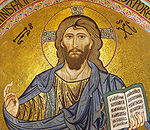- Christianity in Kuwait
-
Christianity by Country
North AmericaSouth AmericaOceaniaChristianity in Kuwait is a minority religion, accounting for about 15% of the country's population, or 350,000 people.
History
The denominations include, but are not limited to, the following:
- 140,000 Catholics in Kuwait. There is a cathedral in Kuwait City, which belongs to the Vicariate Apostolic of Kuwait. The Catholic Vicariate is largely made up of Asians from India, the Philippines, Sri Lanka, Bangladesh, and Pakistan, and Arab Christians from Lebanon, Egypt, Jordan, Palestine, and Syria. Maronite Christians, mostly from Lebanon, also worship at the Catholic cathedral in Kuwait city.
- 67,500 Orthodox Christians, at least. The Greek Orthodox Church has about 3,500 members, while the Armenian Orthodox Church has about 4,000 members. The Coptic Orthodox Church has about 60,000 members. Totals for both the Greek Catholic (Eastern Rite) Church membership and Indian Orthodox Syrian Church membership totals are unavailable.
- 50,000 Protestants in Kuwait. The Anglican Church has about 115 members. The National Evangelical Church has about 15,000 members. There are also other Christian Protestant denominations in the country, with tens of thousands of members. These denominations include Seventh-Day Adventists and the Church of Jesus Christ of Latter-Day Saints (Mormons).
The vast majority of Christians in Kuwait are foreigners, although there are native Christians in Kuwait. However, this information is not publicized by the government. Roughly 200 Christians in Kuwait are locals/natives, who have Kuwaiti citizenship. Around 50 of them are considered to be 'Kuwaiti', despite originally coming from Turkey and Iraq, as they and their families have been in Kuwait for over a hundred years, and speak Arabic with a Kuwaiti dialect. They have more or less assimilated into Kuwaiti society, with no trace of their original homeland in their cuisine or culture. The rest, roughly 150 or so, are more recent arrivals in the 1940s, mostly Palestinians who left Palestine after 1948, as well as a few families from Lebanon and Syria. Their dialect and culture remains more Levantine than Kuwaiti, and their cuisine is also a sign of their ties to their original homeland. Although they are not as assimilated as the former group, the latter group is just as patriotic and tend to be proud of their adopted homeland. Most of Kuwait's local Christians belong to 12 large families, with the Shammas (from Turkey) and the Shuhaibar (from Palestine) families being some of the more prominent ones.
Kuwait is the only GCC country besides Bahrain to have a local Christian population.
A 1980 law prohibits the naturalization of non-Muslims. While Muslim Kuwaiti male citizens are allowed to transmit their citizenship to both their spouses and descendants, Christian Kuwaiti males are only allowed to transmit their citizenship to their descendants, and not to their spouses.
In Kuwait, it is not allowed to proselytize Muslims. Christian publishing houses are not permitted. Islamic religious education is compulsory for all students in state schools, and non-Islamic religious education is prohibited at all types of schools. Organized religious education for religious groups other than Islam is prohibited. However, the constitution allows for religious freedom. Many Churches exist in Kuwait, though they are mostly villas and apartment complexes which are rented out by their respective churches and converted into churches. Kuwait's largest cathedral is situated in the eastern part of Kuwait city.
Sources
Christianity in Asia Sovereign
states- Afghanistan
- Armenia
- Azerbaijan
- Bahrain
- Bangladesh
- Bhutan
- Brunei
- Burma (Myanmar)
- Cambodia
- People's Republic of China
- Cyprus
- East Timor (Timor-Leste)
- Egypt
- Georgia
- India
- Indonesia
- Iran
- Iraq
- Israel
- Japan
- Jordan
- Kazakhstan
- North Korea
- South Korea
- Kuwait
- Kyrgyzstan
- Laos
- Lebanon
- Malaysia
- Maldives
- Mongolia
- Nepal
- Oman
- Pakistan
- Philippines
- Qatar
- Russia
- Saudi Arabia
- Singapore
- Sri Lanka
- Syria
- Tajikistan
- Thailand
- Turkey
- Turkmenistan
- United Arab Emirates
- Uzbekistan
- Vietnam
- Yemen
States with limited
recognition- Abkhazia
- Nagorno-Karabakh
- Northern Cyprus
- Palestine
- Republic of China (Taiwan)
- South Ossetia
Dependencies and
other territories- Christmas Island
- Cocos (Keeling) Islands
- Hong Kong
- Macau
Categories:
Wikimedia Foundation. 2010.

